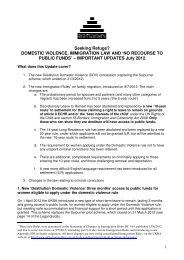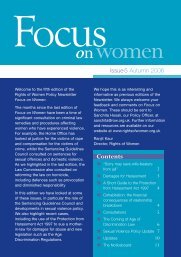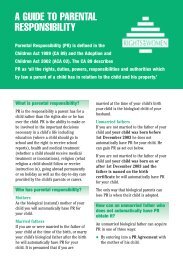Seeking Refuge? - Rights of Women
Seeking Refuge? - Rights of Women
Seeking Refuge? - Rights of Women
Create successful ePaper yourself
Turn your PDF publications into a flip-book with our unique Google optimized e-Paper software.
9<br />
Final refusal and removal<br />
Introduction<br />
If you are unable to appeal against a decision to<br />
refuse you protection any further, you have<br />
exhausted (finished) your rights to appeal. If you<br />
have exhausted your rights to appeal, steps may<br />
be taken to return you to your country. This is<br />
called removal. You can return to your country<br />
voluntarily, or you can be taken into immigration<br />
detention and forcibly removed. This section will<br />
explain the options that are available to people<br />
who have had their claim for protection in the UK<br />
finally refused.<br />
The law discussed here is very complicated.<br />
This Chapter is written to give you<br />
information about the law, but it is not legal<br />
advice. If you have applied for protection in<br />
the UK, or are thinking about doing this, it is<br />
very important that you seek legal advice<br />
from a solicitor or immigration advisor. You<br />
can also contact <strong>Rights</strong> <strong>of</strong> <strong>Women</strong>’s legal<br />
advice line. See Chapter 12 at the end <strong>of</strong> this<br />
book for information about organisations<br />
that provide legal advice.<br />
Legal advice<br />
It is important to seek independent legal advice<br />
before making decisions about returning to your<br />
country. For example, many women are<br />
dependent on their husband’s claim for protection<br />
in the UK and when that is refused, they become<br />
removable along with him. However a woman in<br />
this situation may be able to make her own<br />
application for protection. For information about<br />
the law that determines who is entitled to<br />
protection in the UK, see Chapter 2.<br />
Alternatively, you may be able to make a fresh<br />
claim. A fresh claim is a new claim for protection<br />
in the UK made by someone who has already<br />
made a claim for protection in the past, but who<br />
has had their original claim finally refused. In<br />
order to have a fresh claim, you must have new<br />
and relevant information about why you should<br />
not be returned to your country that creates a real<br />
chance that you will be given protection in the<br />
UK. For further information about fresh claims,<br />
see Chapter 10.<br />
Your legal representative is the person who<br />
advises you on the law and your rights. Your<br />
legal representative may be a solicitor or an<br />
immigration advisor. A solicitor is a qualified<br />
lawyer who is responsible for dealing with the<br />
preparation <strong>of</strong> cases. Some solicitors may also<br />
represent their clients in courts or tribunals.<br />
Solicitors are represented by the Law Society<br />
www.lawsociety.org.uk and are regulated by<br />
the Solicitors Regulation Authority<br />
www.sra.org.uk An immigration advisor is<br />
someone who is not a solicitor, but who is<br />
able to give immigration law advice. For<br />
information about immigration advisors<br />
contact the Office <strong>of</strong> the Immigration Services<br />
Commissioner www.oisc.gov.uk<br />
Barristers are qualified lawyers who represent<br />
clients before courts and tribunals. Barristers<br />
are represented by the Bar Council<br />
www.barcouncil.org.uk and regulated by the<br />
Bar Standards Board<br />
www.barstandardsboard.org.uk<br />
Depending on your financial circumstances<br />
and the merits <strong>of</strong> your case, you may be<br />
entitled to public funding (also known as<br />
legal aid). Public funding enables some<br />
people who cannot afford to pay privately to<br />
get legal advice and representation free <strong>of</strong><br />
charge. However, not all legal representatives<br />
do publicly-funded work and there are limits<br />
on the work that a publicly-funded legal<br />
representative can do on a case. For further<br />
information about public funding and getting<br />
legal advice, talk to your legal representative<br />
or contact Community Legal Advice<br />
www.communitylegaladvice.org.uk<br />
If you are not entitled to public funding, you<br />
may have to pay for legal advice or, if you<br />
cannot afford this, represent yourself.<br />
56
















